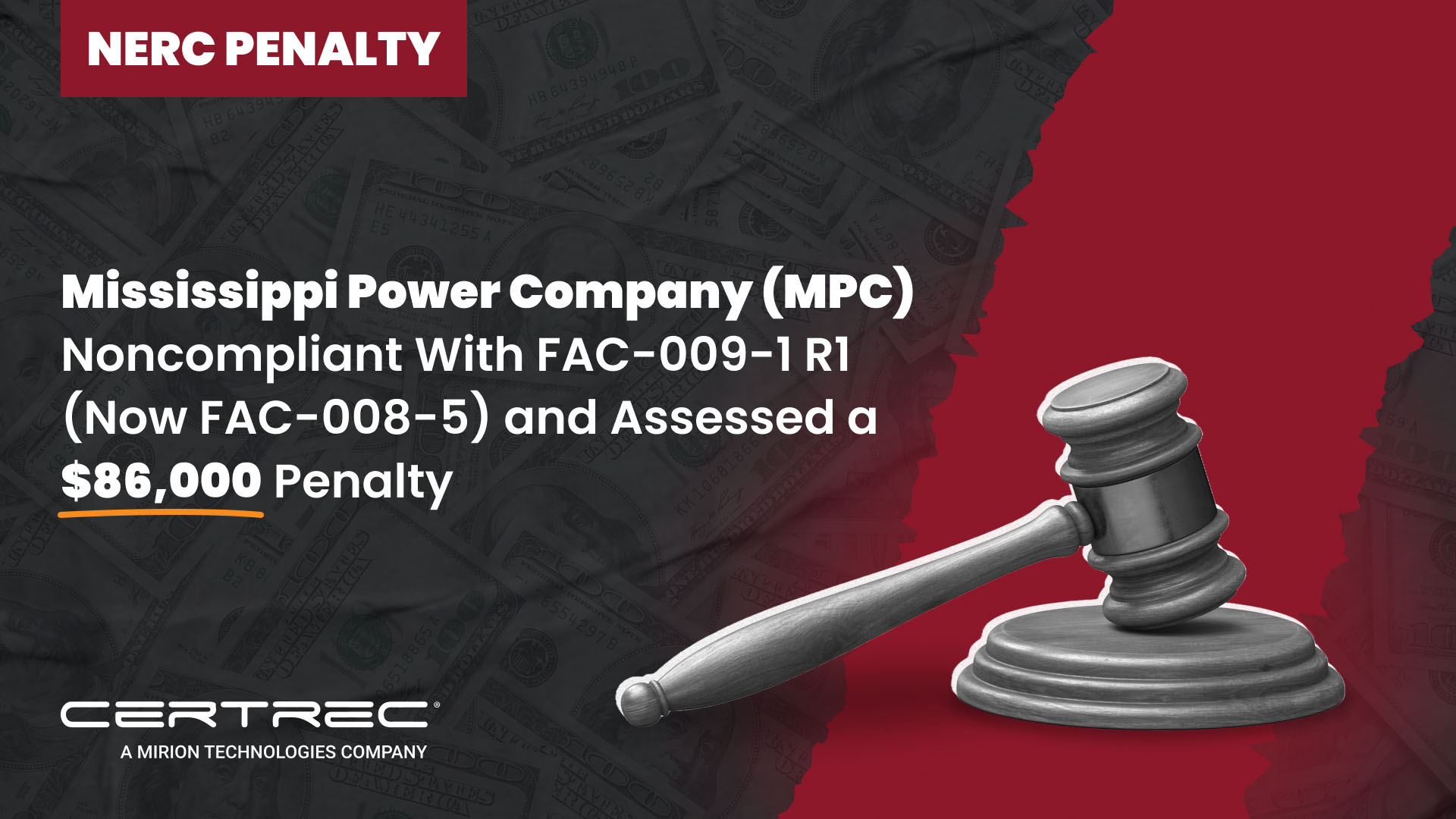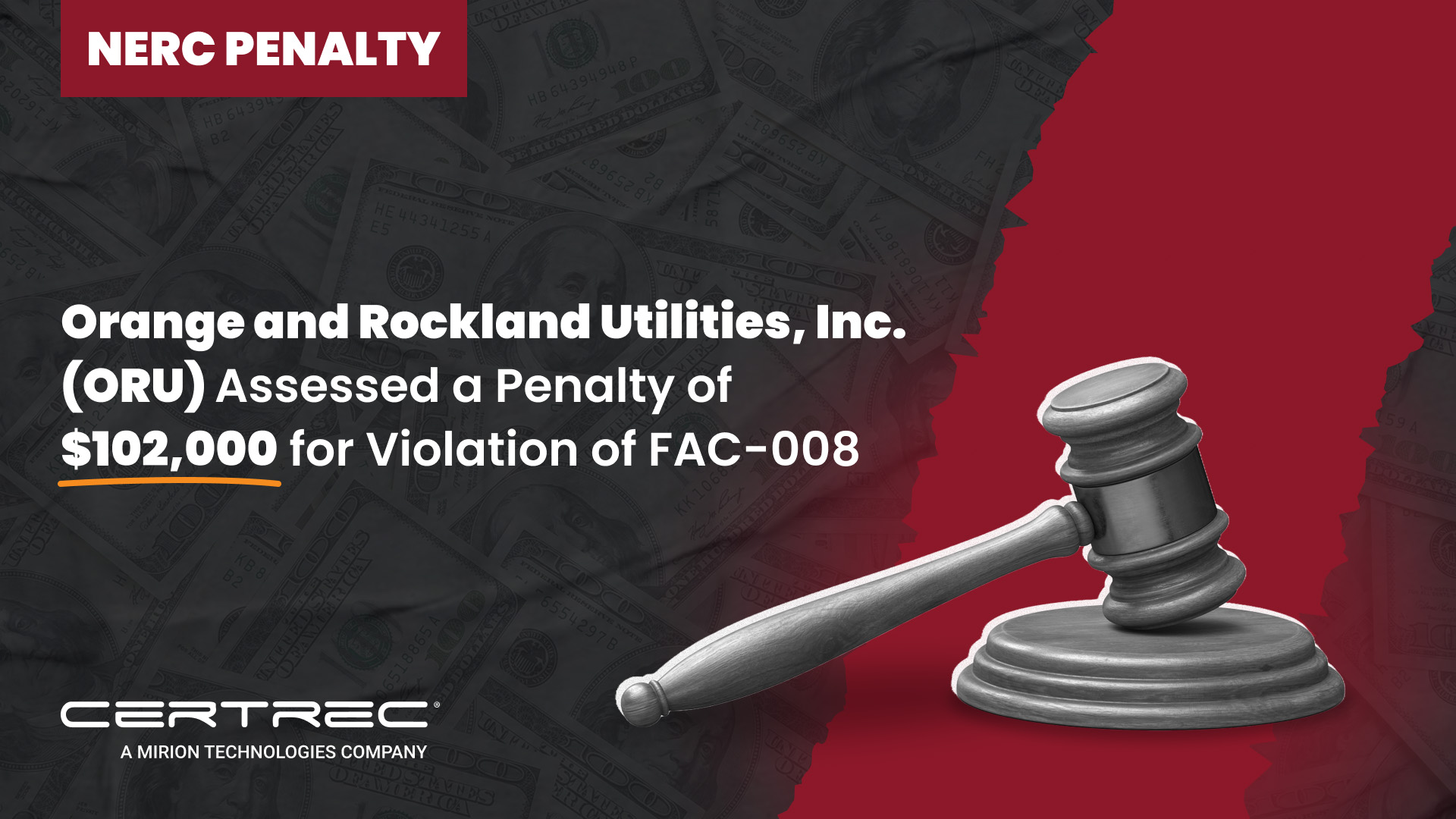Orange and Rockland Utilities, Inc. (ORU) Assessed a Penalty of $102,000 for Violation of FAC-008
Summary of NERC Penalties
REGION | WHEN? | ENTITY | COMPLIANCE AREA | VIOLATION | REASON | PENALTY AMOUNT |
|---|---|---|---|---|---|---|
NPCC / RF | Quarter 4 - September 2025 | Orange and Rockland Utilities, Inc. (ORU) / Rockland Electric Company (RECO) | FAC-008-3 R6 | Development of Facility Ratings inconsistent with Facility Ratings Methodology | Internal review revealed inconsistent ratings across 17 facilities due to failure to consider all series components, incomplete documentation, and lack of formal training. Ratings were either reduced or increased based on corrections during coordinated oversight with RECO. | $102,000 |
Summary:
Orange and Rockland Utilities, Inc. (ORU) submitted a Self-Report to NPCC, as a TO, stating a potential violation of FAC-008-3 R6. ORU is in coordinated oversight with RECO and therefore this noncompliance applies to both ORU and RECO. Based on the internal compliance review, which began in the fall of 2019, ORU and RECO determined that Facility Ratings had been developed that were inconsistent with its FRM for seventeen (17) applicable Facilities, consisting of four (4) 345/138kV transformers and thirteen (13) 138kV transmission lines. ORU determined that 12 Facilities required a change in Facility Ratings. Specifically, eight Facilities required a reduction of at least one of the following ratings: Normal Summer (NS), Long Term Emergency Summer (LTES), Short Term Emergency Summer (STES), Normal Winter (NW), Long Term Emergency Winter (LTEW), and Short Term Emergency Winter (STEW). In addition, one Facility required at least one increase in one of the ratings, and three Facilities required a mix of reduction and increases in the ratings. Similarly, RECO determined that five Facilities required a change in Facility Ratings. Specifically, one Facility required at least one increase in the ratings, and four Facilities required a mix of reduction and increases in the ratings. The changes for ORU resulted in derates ranging from 1-34 percent, with 75 percent of the derates being less than 11 percent, and increases in ratings ranging from 1-17 percent, with 83 percent of the increases being less than nine percent. The changes for RECO resulted in derates ranging from 3-40 percent, with 75 percent of the derates being less than 13 percent, and increases in ratings ranging from 1-6 percent.
Additional Discussion:
Cause
NPCC determined that the duration of the violation spans multiple versions of the Reliability Standard, as follows:
- FAC-009-1 R1, from June 18, 2007, until December 31, 2012 (the Standard’s retirement date).
- FAC-008-3 R6, from January 1, 2013, until September 30, 2021 (the Standard’s retirement date); and
- FAC-008-5 R6, from October 1, 2021, until May 26, 2022, when ORU revised its Facility Ratings by reflecting the rating of the correct MLE for each noncompliant Facility.
NPCC further determined that, for purposes of this violation, there was no substantive change in ORU’s compliance obligations under the applicable Standards and Requirements.
The root cause of this violation was ORU’s failure to consider all series components during the establishment of the overall Facility Ratings. Contributing factors include:
- failure to verify whether the actual completed work on a Facility (including work completed on an emergency basis) reflected the design documentation of the Facility;
- failure to have a process to periodically verify and review historical Facility Ratings and associated documentation; and
- failure to develop a formal process to train responsible staff (T&S Engineering employees) on ORU’s FRM.
Disposition
NPCC considered ORU and RECO’s compliance history and determined there were no relevant prior instances of noncompliance.
ORU has been cooperative throughout the entire enforcement process relating to these violations. Throughout the enforcement process, ORU provided requested information to NPCC that was detailed, organized, and thorough.
ORU recognized and affirmatively accepted responsibility for its conduct by admitting the violations resolved by this Agreement. NPCC is applying mitigating credit because there is independent value in ORU accepting responsibility for its violations.
ORU self-reported the violations. Effective oversight of the reliability and resilience of the BPS depends on self-reporting by Registered Entities. NPCC seeks to encourage self-reporting of noncompliance and, therefore, is applying mitigating credit for the following violations: NPCC2020024044 and NPCC2020024045. Although ORU self-reported all three violations in this Agreement, NPCC recognized that RECO’s Facility Ratings issues were discovered because of the NPCC/ReliabilityFirst Self-Certification process. Therefore, NPCC did not apply mitigating credit to the following violation: NPCC2020024042.
Under coordinated oversight, ORU’s penalty will be divided among the Regional Entities as follows. ORU shall pay $102,000 to the Regions. ORU shall pay $102,000 to NPCC, and NPCC shall divide that penalty amount in two parts based on the relative NEL for each Region. For purposes of penalty allocation, NPCC shall pay $59,177.07 to RF.
About Certrec:
Certrec is a leading provider of regulatory compliance solutions for the energy industry with the mission of helping ensure a stable, reliable, bulk electric supply. Since 1988, Certrec’s SaaS applications and consulting expertise have helped hundreds of power-generating facilities manage their regulatory compliance and reduce their risks.
Certrec’s engineers and business teams bring a cumulative 1,500 years of working experience in regulatory areas of compliance, engineering, and operations, including nuclear, fossil, solar, wind facilities, and other Registered Entities generation and transmission.
Certrec has helped more than 200 generating facilities establish and maintain NERC Compliance Programs. We manage the entire NERC compliance program for 80+ registered entities in the US, Canada, and Mexico that trust us to decrease their regulatory and reputational risk. Certrec is ISO/IEC 27001:2013 certified and has successfully completed annual SOC 2 Type 2 examinations.
For press and media inquiries, please contact marketing@certrec.com.
Share









